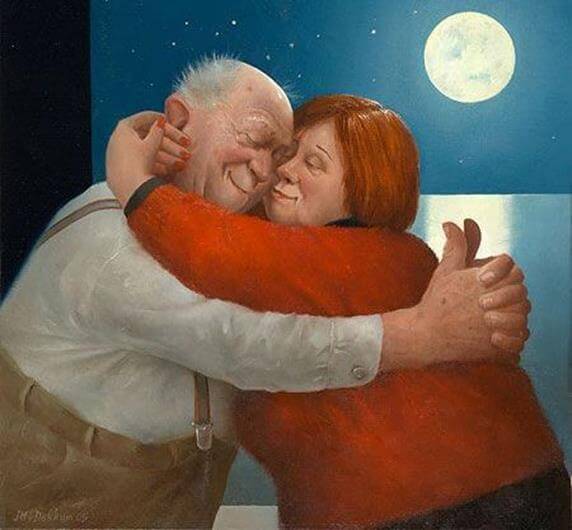My Love for You Goes Beyond Attachment and Fear of Loneliness


Written and verified by the psychologist Valeria Sabater
I love you like I love the stars in the sky; I know that they’re not mine, but they give light to my life and my dreams. I like you because my world seems more whole with you by my side, because you fit into my corners, because you paint trails to create the maps that I want to travel, and I choose to share it with you.
This is love without attachment. A relationship without blind dependency, where each member is capable of respecting space. The relationship is enriching and reciprocal.
Love should bring you happiness and give you the opportunity to discover the best of yourself every day. If all it offers you is sadness and suffering, then it’s not love, it’s dependency. If it fills you with excessive jealousy, fear, and obsession, then it’s attachment.
Sometimes the word “attachment” provokes disagreement. We can’t deny that loving someone involves wanting to be with that person all the time, worrying about them, thinking about their face, their voice, their essence all the time.
There’s a little bit of obsession and neediness that comes with love, which is normal, especially in the beginning. However, we’re talking about attachment in its full meaning, the kind in which we lose our own identity and inner balance over that person.
The kind where we don’t leave space for the personal growth and freedom of each individual. This is where suspicions arise, and even a need for control.
Emotional attachment is a very destructive type of addiction

It’s not an exaggeration to draw parallels between emotional attachment and addiction. Think about blind passion where you need to have the person you love with you at every instant. And when you don’t have them by your side, your world crumbles, you begin to distrust them, and you develop a need to control your partner. It’s dangerous.
Wanting someone isn’t bad or dangerous. Desire gives life emotion, purpose, pleasure. The risk starts when desire transforms into necessity. This is when attachment develops, when you lose control of yourself because you think that you can’t live without the other person.
It’s important to be able to live without the other person. We can’t turn into ships lost at sea when our partner leaves our side for a few days. If there is trust, there is no reason to develop such inordinate fears.
We should learn to live by ourselves and feel whole, secure, and happy with who we are before we can establish a healthy romantic relationship without any negative attachment. Love them, but don’t need them. Share with them, but never give them everything without expecting at least recognition in return.
We need to experience positive attachment during childhood to create a bond with our parents. This offers us security and the possibility to grow up feeling loved and acknowledged. After this stage, it’s our turn to construct our own identities, personalities, and integrity where we feel secure with ourselves, who we are, and what we’ve accomplished.
If you feel good about yourself, if you see yourself as a secure and happy person with good self-esteem, you’ll be able to build a stable and happy relationship with someone else.
You don’t need other people to fill your empty spaces, because you don’t have any. You don’t need anyone to take away your fears, because they are healthy. You don’t need anyone to alleviate your loneliness, because you’re not alone.

Practice detachment or avoid codependent relationships
Love is worth nothing to us if we understand it as suffering. It’s worth nothing to us if it fills us with the fear of being abandoned or betrayed, or with the need to depend on the other person until the point that we become puppets without our own identity.
Don’t dilute yourself in the other person. Don’t do anything for them at such a high cost that you end up fading away like a shell of a person who’s lost their soul. Conquer your addiction to attachment, and fight against codependent relationships.
We know that these ideas are easy to read and understand, but that doesn’t change the fact that even if you know it, you may still fall into this type of relationship. When it comes to love, nobody is in control, but when you fall into this type of situation, it’s your responsibility to know how to react when you realize what’s happened.
The time will come to put emotional detachment into practice so you can walk free, more secure, wiser, and able to love with integrity and without fear.
If we allow the personal growth of our partner, it will help us to be a more emotionally rich and nuanced person, which will enrich the relationship itself.
We should understand that practicing emotional detachment is not the same as breaking ties. On the contrary, it’s respecting yourself and upholding complicit trust where you can let the other person be because you know that they love you, because you love and trust the person who choses to be with you for who you are, and not just to avoid their own loneliness.
Detachment does not mean that you don’t have the right to love, want, or hope for someone with all your heart and soul. It simply means that nobody owns anyone. If somebody owns you, they control you, and if they control you, it means they’re not letting you be yourself.
Being free on the inside is not incompatible with creating love. It’s leaving space to let the passion feed you without needs and fears, offering the best of yourself to the other person.

Images courtesy of Babs tarr, Lauri Blank
I love you like I love the stars in the sky; I know that they’re not mine, but they give light to my life and my dreams. I like you because my world seems more whole with you by my side, because you fit into my corners, because you paint trails to create the maps that I want to travel, and I choose to share it with you.
This is love without attachment. A relationship without blind dependency, where each member is capable of respecting space. The relationship is enriching and reciprocal.
Love should bring you happiness and give you the opportunity to discover the best of yourself every day. If all it offers you is sadness and suffering, then it’s not love, it’s dependency. If it fills you with excessive jealousy, fear, and obsession, then it’s attachment.
Sometimes the word “attachment” provokes disagreement. We can’t deny that loving someone involves wanting to be with that person all the time, worrying about them, thinking about their face, their voice, their essence all the time.
There’s a little bit of obsession and neediness that comes with love, which is normal, especially in the beginning. However, we’re talking about attachment in its full meaning, the kind in which we lose our own identity and inner balance over that person.
The kind where we don’t leave space for the personal growth and freedom of each individual. This is where suspicions arise, and even a need for control.
Emotional attachment is a very destructive type of addiction

It’s not an exaggeration to draw parallels between emotional attachment and addiction. Think about blind passion where you need to have the person you love with you at every instant. And when you don’t have them by your side, your world crumbles, you begin to distrust them, and you develop a need to control your partner. It’s dangerous.
Wanting someone isn’t bad or dangerous. Desire gives life emotion, purpose, pleasure. The risk starts when desire transforms into necessity. This is when attachment develops, when you lose control of yourself because you think that you can’t live without the other person.
It’s important to be able to live without the other person. We can’t turn into ships lost at sea when our partner leaves our side for a few days. If there is trust, there is no reason to develop such inordinate fears.
We should learn to live by ourselves and feel whole, secure, and happy with who we are before we can establish a healthy romantic relationship without any negative attachment. Love them, but don’t need them. Share with them, but never give them everything without expecting at least recognition in return.
We need to experience positive attachment during childhood to create a bond with our parents. This offers us security and the possibility to grow up feeling loved and acknowledged. After this stage, it’s our turn to construct our own identities, personalities, and integrity where we feel secure with ourselves, who we are, and what we’ve accomplished.
If you feel good about yourself, if you see yourself as a secure and happy person with good self-esteem, you’ll be able to build a stable and happy relationship with someone else.
You don’t need other people to fill your empty spaces, because you don’t have any. You don’t need anyone to take away your fears, because they are healthy. You don’t need anyone to alleviate your loneliness, because you’re not alone.

Practice detachment or avoid codependent relationships
Love is worth nothing to us if we understand it as suffering. It’s worth nothing to us if it fills us with the fear of being abandoned or betrayed, or with the need to depend on the other person until the point that we become puppets without our own identity.
Don’t dilute yourself in the other person. Don’t do anything for them at such a high cost that you end up fading away like a shell of a person who’s lost their soul. Conquer your addiction to attachment, and fight against codependent relationships.
We know that these ideas are easy to read and understand, but that doesn’t change the fact that even if you know it, you may still fall into this type of relationship. When it comes to love, nobody is in control, but when you fall into this type of situation, it’s your responsibility to know how to react when you realize what’s happened.
The time will come to put emotional detachment into practice so you can walk free, more secure, wiser, and able to love with integrity and without fear.
If we allow the personal growth of our partner, it will help us to be a more emotionally rich and nuanced person, which will enrich the relationship itself.
We should understand that practicing emotional detachment is not the same as breaking ties. On the contrary, it’s respecting yourself and upholding complicit trust where you can let the other person be because you know that they love you, because you love and trust the person who choses to be with you for who you are, and not just to avoid their own loneliness.
Detachment does not mean that you don’t have the right to love, want, or hope for someone with all your heart and soul. It simply means that nobody owns anyone. If somebody owns you, they control you, and if they control you, it means they’re not letting you be yourself.
Being free on the inside is not incompatible with creating love. It’s leaving space to let the passion feed you without needs and fears, offering the best of yourself to the other person.

Images courtesy of Babs tarr, Lauri Blank
This text is provided for informational purposes only and does not replace consultation with a professional. If in doubt, consult your specialist.







